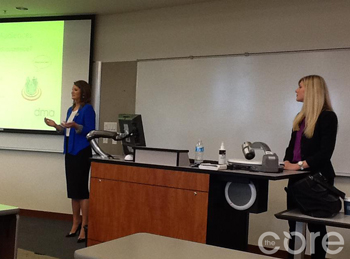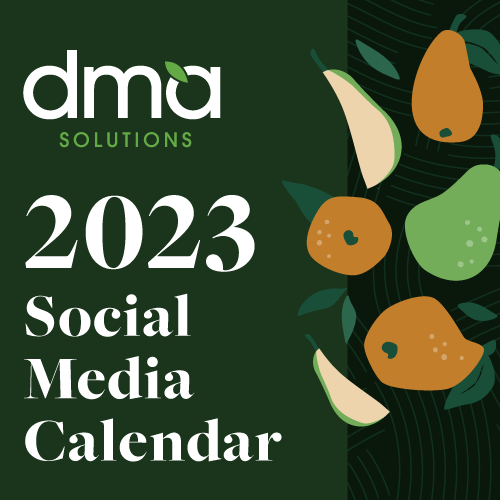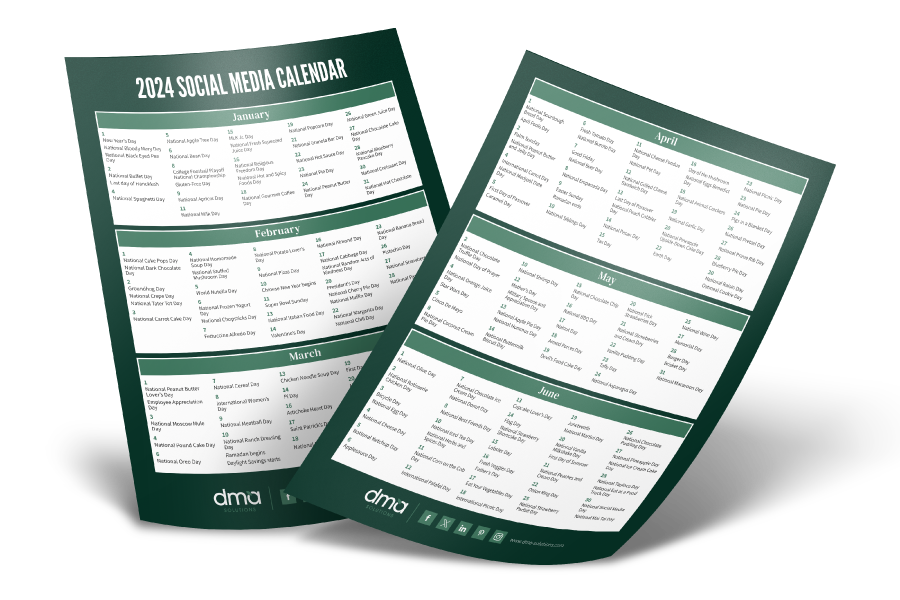
Remember what it was like to be sitting in a classroom wondering what you were going to do with the rest of your life? The possibilities were exciting, scary and somewhat overwhelming, right?
Well, last week, a few members of the DMA team had the pleasure of visiting several classrooms at Texas A&M University, full of young adults wondering the same thing. During our two days on campus, Dan’l, Mackenzie and I met with students in majors ranging from Agricultural Economics and Communications to Marketing and Advertising. Really, we were there to speak about the business of “marketing.” But, it turns out that the students had a lot of great questions about the produce industry (hooray!) that we felt obliged to answer in the classroom and share below.
Student: Do droughts, freezes and other surprises from Mother Nature impact your clients and your work with them?
DMA: Yes. If one of our citrus clients experiences a freeze, it may affect the availability of their lemons or oranges. Similarly, drought may delay the availability of onions or watermelons. In these cases, it is our job to inform consumers and let them know when they can expect products on the shelves.
Student: How do you handle negative feedback related to fresh produce on social media?
DMA: Our philosophy is that negative feedback is an opportunity to show consumers that we are listening and that we care about their questions and concerns. Typically, we respond by apologizing on behalf of the client and finding out more information. Then, we determine next steps to address the specific issue. It’s best to respond as quickly as possible and to show the consumer that we’d like to make it up to them. When we address a problem with this quick and caring strategy, we often find that consumers feel compelled to purchase the brand again. Sometimes, they even sing our clients’ praises once an issue is resolved or their questions are answered!
Student: What do you love most about your work in fresh produce?
Dan’l: As a marketer, it was critical for me early on to market a product, service and/or company I could believe in and support. Passion has fueled me from a young age and I cannot imagine being more passionate about the opportunity to market food that is grown. Currently, what I love most about my work is that I’m in a position to share that passion with others … including you.
Student: What do you look for when hiring a fresh produce marketing intern?
DMA: We look for someone who has some work experience, someone who is confident, competent and eager to learn. Recently, our internships have focused on the social aspect of marketing fresh produce, all the way from planning promotions to executing them, so it helps if candidates are familiar with using Facebook and Twitter for businesses. Throughout the process of hiring, we’ll look for someone who stands out from the crowd, whether it’s in their personality, a creative resume, or something else that sets them apart.
Student: If I don’t know anything about the fresh produce industry, can I still find a career in this space?
DMA: Of course! The concepts and skills you are learning, whether business management, marketing or something in between will transfer to the produce industry. The example problems you solve with widgets or cotton also need to be solved in real life with apples and zucchini. Plus, no matter what job you take after graduation, you’ll most likely find there’s a learning curve anyway.
 This particular question reminded us of why we are committed to spreading the word about the produce industry. Even with excellent outreach by the PMA Foundation, we still have plenty of room to teach students about our industry, especially in Texas. In fact, many of the leaders at Texas A&M shared their needs with us, and as a result , we have identified several ways companies can give back and create awareness of the produce industry at the same time. Here are a few of them:
This particular question reminded us of why we are committed to spreading the word about the produce industry. Even with excellent outreach by the PMA Foundation, we still have plenty of room to teach students about our industry, especially in Texas. In fact, many of the leaders at Texas A&M shared their needs with us, and as a result , we have identified several ways companies can give back and create awareness of the produce industry at the same time. Here are a few of them:
- Establish a scholarship for a specific major related to the nature of your business
- Volunteer to speak to class(es) about your company, expertise and your career
- Invite a class to visit your fields, groves , greenhouses or place of business
- Sponsor an agriculture-related student organization … or even a non-ag organization
While we answered the students’ questions above (and many more), we feel as though we learned just as much from the students about what we can do to support them as they learned from us about our industry. What have you learned from younger generations? How would you have answered these questions? Tell us in a comment below and we’ll share it with our friends at Texas A&M and other schools!
Many thanks to Pam Vernon and Dimitry Vedenov with the Department of Agricultural Economics, Tracy Rutherford and Deborah Dunsford with the Department of Agricultural Leadership, Education and Communications, Andrew Loring with Mays Business School and American Marketing Association and Lindsey LaRosa with Aggie Advertising Club for hosting us in their classes and organizations.











